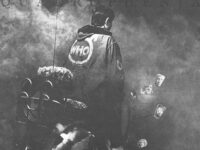It’s a little strange how everyone considers Daryl Hall about 90 percent of Hall and Oates, but whenever he issues an album under his own name, nobody pays attention.
Maybe it’s a question of time: the only one released squarely during Hall and Oates’ salad days was his first one, 1980’s Sacred Songs, and no one knew what to make of his most improbable collaboration with experimental-rock pioneer Robert Fripp. (It’s actually a triumph against the odds.). Maybe, too, going solo meant Hall felt a need to stand apart from his hitmaking partnership with John Oates.
It seems the passage of time – more than three decades later, Laughing Down Crying arrived on Sept. 27, 2011 as just his fourth album since the Fripp collaboration – and a newfound looseness carried over from his acclaimed web-based show enabled Hall to approach this with only the goal of making a good pop record. That’s exactly what he achieved.
The production was updated and very much lives in its era, but everything else transports us back to the Daryl Hall of 1983. His magic voice is in great shape, and he can easily hit most if not all those hard notes that he might have struggled with on the last couple of Hall and Oates albums. He also made no effort at all to distinguish this from the music he makes with Oates – and viewed in that way, this is the best Hall and Oates album since Big Bam Boom. Yes, really.
Track for track, every song evokes memory of a track from classics like Voices or H2O, or even reaching back to the more folk-oriented numbers of the ’70s, stealing the vibe but not the melodies. He made similar use of background and harmony vocals, so much so that you’d swear John Oates was in the studio for every song – and one occasionally wondered why he wasn’t brought along for this fun ride.
It was certainly easy to imagine Oates there, just to complete the picture in your mind that’s suggested by your ears. Long time Hall and Oates bassist, guitarist, producer and virtual third member T-Bone Wolk does appear on some tracks, his last hurrah before being felled by a heart attack during recording sessions for Laughing Down Crying.
Songs ranged from the acoustic driven title tune to the swampy blues of “Problem With You.” Maybe it’s because I love the smooth, ice-cool soul of “I Can’t Go For That,” but “Eyes For You (Ain’t No Doubt About It)” was the cut that demanded the repeat button the most. On nearly every track, Hall’s songs were as hook-laden as a bass lure, coming as easily as they did when he and his mustached little buddy were ruling the radio.
Even a tragedy like losing T-Bone Wolk couldn’t slow down Daryl Hall for long; he rediscovered his pop muse, all on his own. Pay attention this time.
- Jeff Oster, Vin Downes + Tom Eaton – ‘Seven Conversations’ (2024) - May 6, 2024
- David Torn – ‘Adityahridayam 321’ (2024) - May 5, 2024
- Ivo Perelman + Matthew Shipp – ‘Magical Incantation’ (2024) - May 4, 2024




